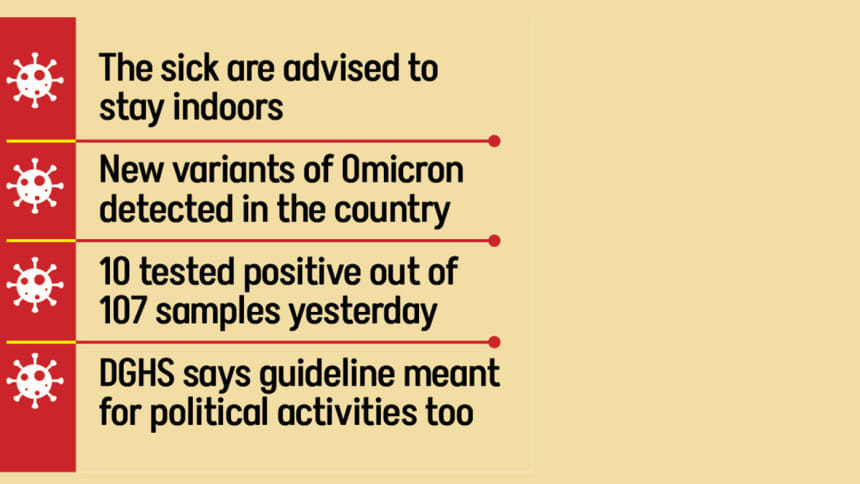Avoid all forms of public gatherings

The health authorities yesterday issued an 11-point directive for the general public and suspected Covid-19 patients amid a rise in cases both within the country and in neighbouring nations.
The directives include an appeal to avoid all forms of public gatherings.

They also make wearing masks mandatory in crowded places. People have also been advised to wear masks to protect themselves from respiratory illnesses.
Prof Md Abu Jafor, director general of the Directorate General of Health Services (DGHS), announced the directives at a press conference held at the DGHS headquarters in the capital.
"We want to create awareness among people, not spread panic," he said, adding that the health ministry and DGHS are working jointly with relevant ministries and agencies regarding Covid-19 tests, medicine, protective equipment, and related issues.
Replying to a question, he said their directive for people to avoid public gatherings will also be applicable to political activities.
The directives came after the Covid infection rate last month reached a 29-month high, and there was a Covid-19-linked death on June 5 after a long gap.
In the last 24 hours, 10 people tested positive out of 107 samples collected from Dhaka, according to the DGHS. The number was 13 out of 101 in the previous 24 hours.
Meanwhile, our correspondents in Chattogram and Cox's Bazar, citing local health officials, said two people -- one in each district -- have been tested positive.
Prof Jafor said the infection rate in the country is still lower than in neighbouring countries.
However, the actual number of infections remains unknown due to limited testing. Increasing public awareness would encourage more tests and reveal the true scale of the outbreak, he added.
Other directives of the DGHS include covering the nose and mouth with your elbow or a tissue when sneezing or coughing; disposing of the used tissue immediately in a covered waste bin; frequently washing hands with soap and water or using hand sanitiser for at least 20 seconds; not touching your eyes, nose, and mouth with unclean hands; and avoiding contact with infected individuals while maintaining a minimum distance of 3 feet.
People with fever, cough, and breathing difficulties are advised to stay home until recovery and wear a mask covering their nose and mouth. Caregivers should also wear masks as a precaution. If necessary, people are urged to contact the nearest hospital or call the IEDCR at 01401-196293 or the Health Portal at 16263.
The infection rate saw a sharp rise in May, according to the analysis of Covid-19 surveillance data conducted by the Institute of Epidemiology, Disease Control and Research (IEDCR).
Of the 1,409 samples tested in May, 9.51 percent tested positive for Covid-19 — the highest since January 2023, it said.
However, its scientists have emphasised that there is currently no major reason for public concern and stressed the importance of maintaining standard Covid-19 precautions.
Additionally, two new SARS-CoV-2 Omicron subvariants, XFG and XFC, were detected for the first time at Chattogram Medical College Hospital in April, according to a hospital-based influenza surveillance study jointly conducted by icddr,b and IEDCR.
Prof Jafor said that, with Covid infection rates rising in many countries and the emergence of new variants, directives have already been issued for international travellers and port authorities.
On June 4, the DGHS directed relevant authorities to strengthen health screening and surveillance measures at all land, river, and air entry points to prevent the transmission of new subvariants of the coronavirus — particularly Omicron LF.7, XFG, JN.1, and NB.1.8.1 — detected in several neighbouring countries, including India.
They also advised the public to avoid travelling to India and other affected countries unless necessary.
Prof Jafor said creating public awareness and preparing for the unfolding situation has become necessary, as people have let their guard down against Covid since the end of the pandemic period.
He said the government is in discussions with international agencies and friendly countries to procure more test kits, as some of the stored kits have expired.
"We have already collected 28,000 rapid test kits, and 10,000 RT-PCR test kits are expected to arrive tomorrow [Wednesday]," he added.
Prof Jafor stressed the need for strengthening the vaccination drive against Covid.
He urged all unvaccinated individuals over 18 to get vaccinated, and stressed that pregnant women, people over 60, and those with comorbidities must receive an additional dose.
He added that over 17 lakh doses have already been supplied to civil surgeons, with 14 lakh more available at vaccination centres.
DGHS's Director (hospital) Abu Hossain Md Moinul Ahsan and Line Director of Communicable Disease Control Prof Halimur Rashid, among others, were present at the briefing.

 For all latest news, follow The Daily Star's Google News channel.
For all latest news, follow The Daily Star's Google News channel. 





Comments